As the penny drops for the PM, is it too little too late?
The lack of moral clarity in guiding a response from the beginning on anti-Semitism has diminished Anthony Albanese’s leadership.
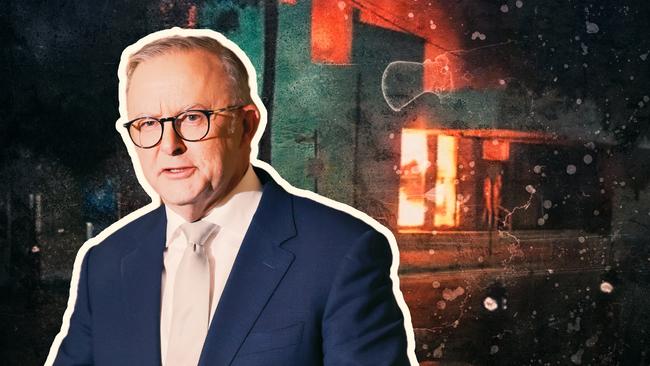
For the past 15 months Anthony Albanese has presided over a catastrophic failure to comprehend the rise of anti-Semitism in Australia. It is a grotesque development that was unthinkable before October 7, 2023. Added to it has been an unwillingness at all levels of government to acknowledge the primary source of this.
The lack of moral clarity at the national level in guiding a response from the beginning has diminished Albanese as Prime Minister. It is now a question of whether his leadership has been irreparably damaged.
For a combative leader whose life mission has been the political contest, the apparent absence of political instinct on this issue has been astonishing. This week the penny appeared to drop in the wake of two violent anti-Semitic attacks. The Prime Minister’s tone and language changed demonstrably. Some have argued that this was the leader the nation needed a year ago. A partial political epiphany after 15 months of paralysis.
The same can’t be said of Albanese’s Foreign Minister, Penny Wong, who has doubled down on Australia’s foreign policy posture towards Israel. It has gone from hostility to demonisation. To suggest Australia’s actions in the UN have no corollary with the domestic outbreak of anti-Semitism is at best disingenuous and at worst absurd.
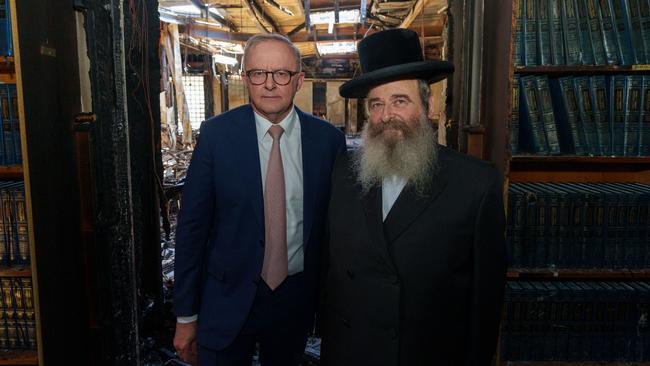
In an exclusive interview with Inquirer this week, Albanese rejects the criticisms levelled at him and rails against any suggestion he has been anything other than a lifelong devotee to the fight against racism, and in particular anti-Semitism.
This may be so, but Albanese will now be judged not only by his words but also by the actions of his government. His language suggests a split from the cabal of western Sydney ministers, those considered among his strongest supporters, who insist that for political purposes anti-Semitism be treated in equal measure to Islamophobia.
“There is a failure to draw a distinction,” Albanese says. “It’s legitimate for people to have different views on the Middle East. The problem here is people being targeted and saying it’s because it’s the actions of Israel, but essentially it’s because they are Jewish. It’s not anti-Israel, it’s not. Wednesday’s attack was against cars in Woollahra, homes in Woollahra, it is sickening. It is sickening, and having people targeted because of who they are is an outrage.
“It does nothing to advance the causes that people purport to be supporting. It sets it back.”
Albanese is explicit in his rejection of the notion promoted by some of his most senior colleagues that Islamophobia needs to be called out in the same breath as anti-Semitism.
“They are different things, of course they are,” he says when asked if he supports the views of those colleagues. “When I’m talking generally about racism, the same as racism against Indigenous people, it’s always bad but there is a specific issue with anti-Semitism … and that needs to be dealt with specifically.”
This is a significant statement from the Prime Minister. It is an acknowledgment that sets him apart from some in his cabinet.
People have the right to be sceptical considering the federal government’s often contorted and belated recognition of the problem. Is this really a moment of personal reflection for Albanese or is it a case of political necessity?
Even before the terrorist attack on the Adass Israel Synagogue in bayside Melbourne on Friday last week and yet another torching of a car in Sydney’s eastern suburbs in the early hours of Wednesday this week, the broader electoral assessment of Albanese was that of a weak leader.
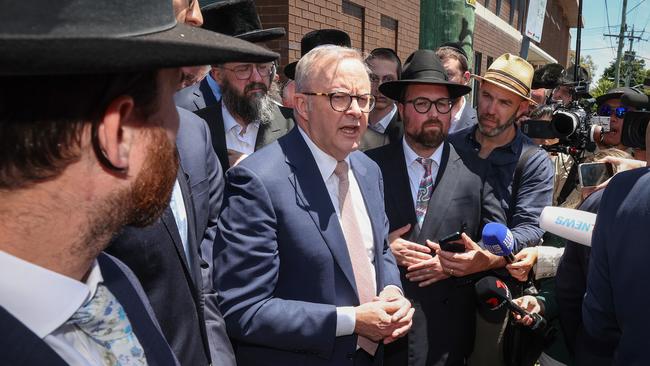
Of all the prime ministers since 2008, Albanese is regarded as the least decisive and strong. This is an assessment based on Newspoll surveys that go back only this far. This assessment of Albanese can no longer be divorced from the issue of rising anti-Semitism: that the increasing violence towards Jewish Australians is in part due to a lack of federal leadership.
This has become central to a theme that the Coalition has sought to cultivate for the past 18 months. With the next federal election outcome hanging in the balance, Albanese’s leadership, or at least the question of strength versus weakness, risks becoming a swing issue, if not the defining one.
Labor’s contortions over the Israel-Palestinian issue lie at the heart of this problem for Albanese. A lack of authority and the will to stare down anti-Israel elements in his cabinet until now have rendered him outwardly impotent to what is an unprecedented wave of anti-Semitic violence and intimidation. The explanation is uncomplicated. The October 14, 2023, voice referendum was the catalyst for the start of a perception that he lacked conviction and/or judgment.
But Albanese also misread the nature and depth of the anti-Semitism movement that was triggered only a week before the referendum when Hamas launched its raids from Gaza to butcher 1200 civilians in Israel. It was as if one failure of political judgment morphed directly into another and has combined to fuel the motif that the Coalition has sought to hang on Albanese.
As one senior Labor figure says, Albanese had several opportunities to lead from a national platform and strike out anti-Semitism before it took hold. The first was the response to the Sydney Opera House protests on October 9, 2023.
There is political risk at several levels for Albanese on this issue. One charge levelled against him is that Labor is deferring to one side of the domestic sectarian divide out of fear about backlash in seats with large Muslim constituencies. Labor’s tone of hostility towards Israel also has been viewed through the prism of deliberate domestic posturing to address the threat the Greens pose in inner-city seats.
There can be no exaggeration to this trauma inflicted on Australia’s national idenity. For the first time, international Jewish organisations have issued a travel warning for Australia, a place no longer safe for Jews to visit. This has made international headlines.
Executive Council of Australian Jewry co-chief executive Alex Ryvchin has described the rise in anti-Semitism as a “crisis that is engulfing our nation”. Considering Australia’s history as home to the greatest number of Holocaust survivors per capita outside Israel, this is an astonishing development.
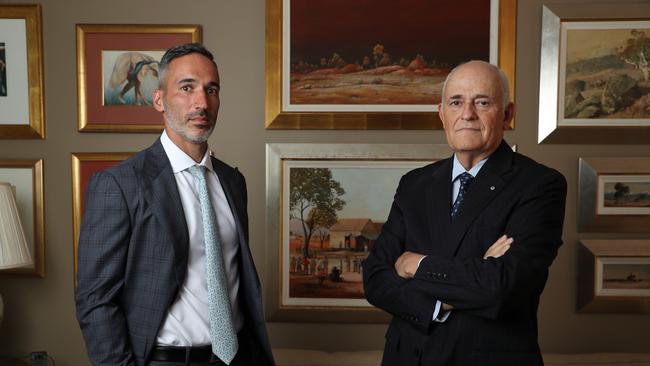
“It is the steepest increase in anti-Semitism in Australian history and the greatest increase in one year anywhere in the civilised world,” Ryvchin says. “It shouldn’t require a place of worship ignited and holy scrolls set alight for the Prime Minister of this country to act decisively. This should have happened 14 months ago, but hopefully this is the moment that leads to that national unity, that reckoning, that can actually drive this hatred from our midst.”
Among the key criticisms of Albanese this week was his delay in calling the synagogue attack an act of terrorism. Yet he was not alone. Neither Peter Dutton nor opposition home affairs spokesman James Paterson were willing to do so on the day it happened. The rationale was that they didn’t want to get ahead of the Australian Federal Police or ASIO. This changed last weekend when others outside government began to use the label.
Clearly the opposition saw a political opportunity. Albanese finally declared the event terrorism on Monday, two days later. While it was a long 48 hours, Albanese would argue he had a greater degree of responsibility and caution was important.
One is reminded of former Israeli diplomat Abba Eban, ironically, who once said of men and nations that they behaved wisely once they had exhausted all the other alternatives. Of all the criticisms of Albanese, it is perhaps this that is most pertinent. He made the right call in the end but was damaged by the perceived procrastination.
This week Albanese has changed his tone considerably. His language and action have been strident and purposeful. He appears to have decided the moral imperative outweighs the political.
But one good speech a year too late will mean little unless there is a decisive commitment to tackle this issue at a national level. Albanese considers that he is being unfairly attacked by the media but he must understand that he has already paid a price, as shown in the polls, for a perceived lack of muscularity.
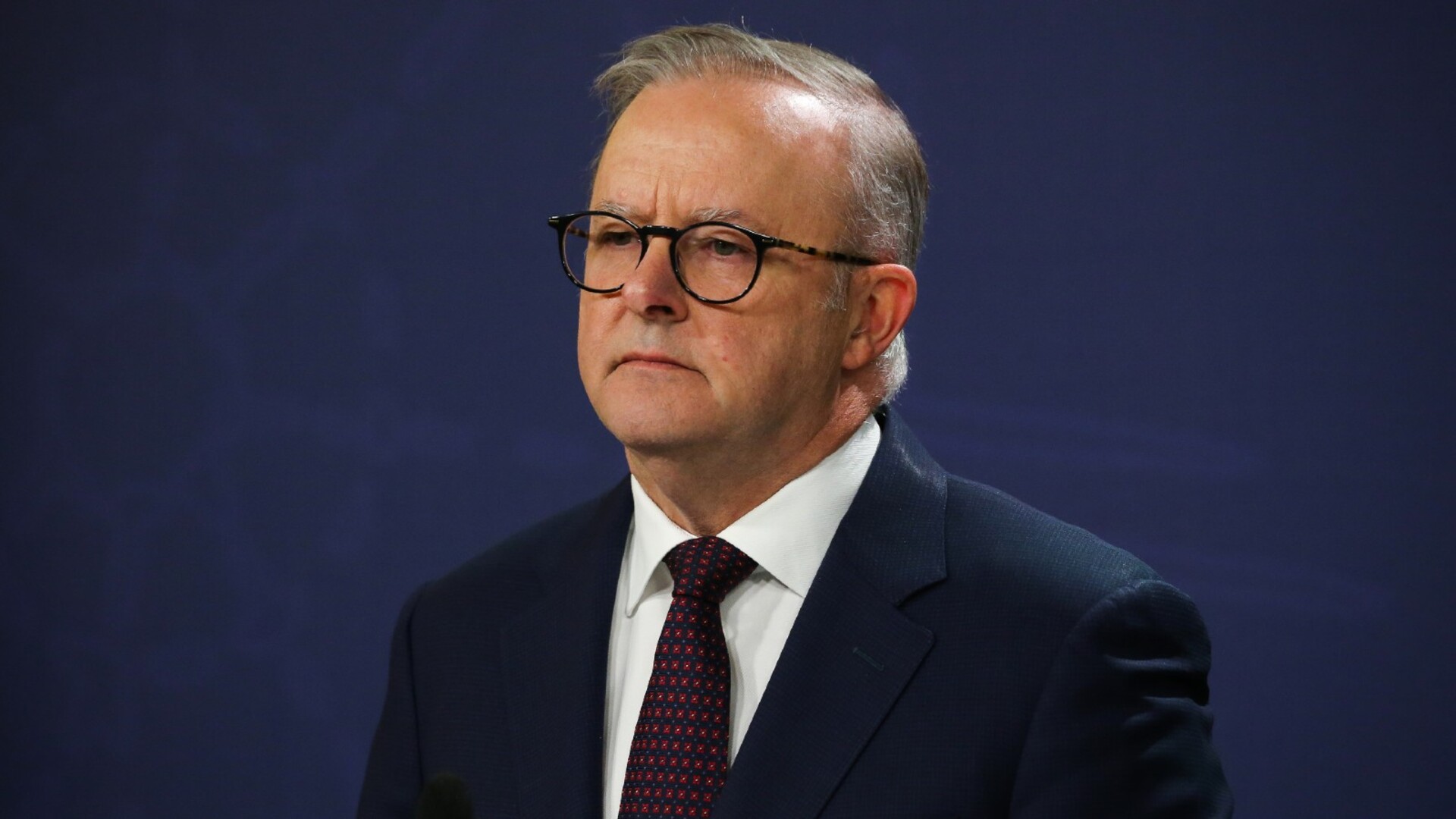
Jewish leaders attest to the emotional response they witnessed in him when he attended the Adass Israel Synagogue on Tuesday and was guided through its charred remains. Albanese is deeply offended that on some fringes he is considered to blame. That such criticism is being directed at him personally exposes the depth of emotion and community anger that has arisen.
“I find it completely offensive that somehow I am responsible,” he tells Inquirer. “It’s just really offensive for someone who has always been against racism. I have a record of 40 years without exception in standing up to this.
“For my entire life I have been an opponent of racism in all its forms, and anti-Semitism in particular. I was one of the founding members of Students Against Racism at Sydney University. I led the campaign against (boycott, divestment and sanctions) 20 years ago, when people had hardly heard of it. I called it out. BDS is similar to what we are seeing with doxxing, which is targeting people because they are Jewish. Some of it comes from ignorance. I think racism and anti-Semitism is learned. It is fear.
“What we are seeing is an attempt to create fear in the community, which is why the Jewish community does feel under siege. I don’t understand racism. Martin Luther King had a great saying that it scars the soul.”
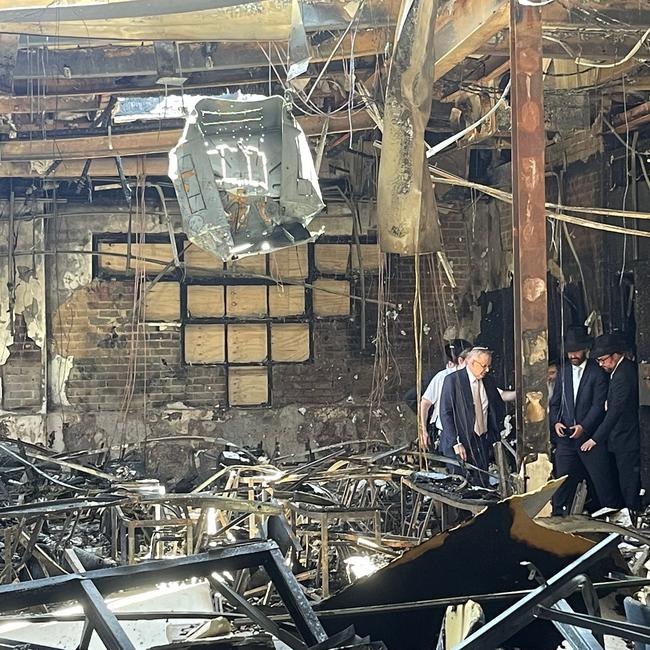
The relationship between the Jewish community and Labor has never been worse. But Albanese has influential supporters in the community who believe his personal commitment to combating anti-Semitism. Peter Wertheim, co-chief executive of the Executive Council of Australian Jewry, Australia’s peak Jewish lobby, is reluctant to criticise Albanese overtly, acknowledging that no country has got it right.
“Albanese is a decent bloke, he is not putting it on, and he genuinely abhors all forms of racism, but specifically anti-Semitism,” Wertheim says. “The problem is that domestic politics gets in the way, and it’s not only in Australia, it’s everywhere. No country has got this right. The explosion in the number of incidents and the severity of it, it is unarguable.”
Wertheim notes that Albanese has taken a stronger tone this week.
“He always has had an understanding of the problem in his mind, but visiting a synagogue that had been torched I think re-enforced it at a deeper emotional level,” Wertheim says. “The visit to the synagogue and speaking to the rabbis has impacted him emotionally. They have been doing things before with banning the Nazi salute, the anti-doxxing laws … but the urgency of it and the fact that anti-Semitism, you just can’t pretend it’s all coming from neo-Nazi elements, there is now a fuller readiness to acknowledge it’s coming from the left side of politics and religious extremists.”
Asked if a stronger stance from Albanese from the beginning would have made a difference, Wertheim says it may have but it is difficult to know. It’s a hypothetical.
“It’s a difficult question to answer,” Wertheim says. “Counteracting a cultural trend is not just a matter of political leadership, as important as it is. There has to be a mix of things – legislative change, legal enforcement by police, which has been lacking at times, and then there is education. Those sorts of things can help create a community momentum.
“I think the penny has started to drop, particularly now with the escalation into violence.”
In its most reductive form, Labor has grappled with a crude choice for the best part of the past two decades – elements within the branch-level constituency that view the Jewish community as socially elite and Palestinians as an underclass oppressed by Israel. This ignorance of the Jewish struggle has been intertwined with an anti-Americanism that has been dominant within the Labor Left since the 1970s.
Some have tried to draw parallels with Australian Labor and the anti-Semitism that tore apart the British Labour Party under Jeremy Corbyn as leader. This was a deliberate exercise fuelled by the influx of anti-Israel elements into the party and the formalisation of a pro-Palestinian foreign policy position. The Australian Labor experience would be a false comparison.
While there are elements of anti-Semitism within pockets of the Labor Left, it is not a problem that Australian Labor has experienced more broadly. Former Labor leader Bill Shorten alluded to the contradiction in his party when he was the first Labor politician to visit the site of the synagogue firebombing on Friday morning last week.
Implicit in his description of the event was that his own government’s hostility towards Israel could not be separated in the current context from rampant anti-Semitism. “The hostility to Israel has morphed into anti-Semitism and we need to call it out,” Shorten said. “Leaders on all sides of politics continue to need to be united and committed to demonstrate that Australia is better than this.”
Local Labor member and Jewish MP Josh Burns also was pointed in his criticism of his own government. “For months and month, we’ve been warning of the rise of anti-Semitism. The Jewish community has been screaming, saying that we’re really worried about this, that this has been escalating,” he told ABC. “We need to stamp this out. We need to throw the full resources of government to ensure that these anti-Semitic incidents are crushed.”
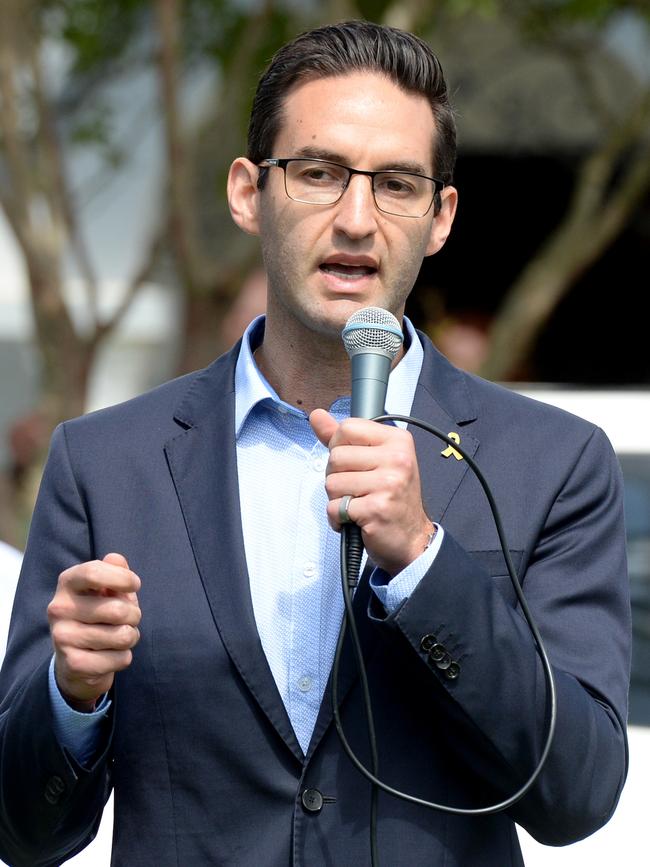
Shorten makes the point that in the immediate aftermath of the October 7 massacre, Australia witnessed a rise in anti-Semitism, even before Israel began its campaign to defend itself. While this could be seen as a rebuke aimed at Albanese, it is also a direct contradiction of Wong’s obstinate denial of reality as she continues to hide behind a legal definition of anti-Semitism as not necessarily being defined by criticism of Israel or Zionism.
Australia’s contemporary experience undermines Wong’s claim. There is a legitimate claim that Labor’s foreign policy position and increasing hostility towards Israel on the international stage has created a permissive environment for anti-Semitism to take hold domestically. Wong’s refusal to accept this was expressed this week when she sought to draw moral equivalency between Israel and Russia and China. The timing of the speech was one thing, but the failure to recognise that only one of the countries mentioned was a democracy was staggering.
This has exposed Albanese’s other weakness and the haste in which Wong has sought to reposition Australia’s posture towards Israel. Wong is rapidly becoming a focal point among Labor MPs concerned about the broader government agenda on Israel.
As one Labor source said of the most recent UN vote demanding Israel withdraw from the Golan Heights: “Wong demanded Israel hand back the Golan Heights to Syria … only days later Syria collapses and Israel rolls in to secure the Golan Heights because they don’t want jihadists on their border. Talk about a failure to read what is going on in the Middle East.”
There are no two sides to anti-Semitism. It is a 2000-year-old problem. And history has shown what happens when people start burning down synagogues.


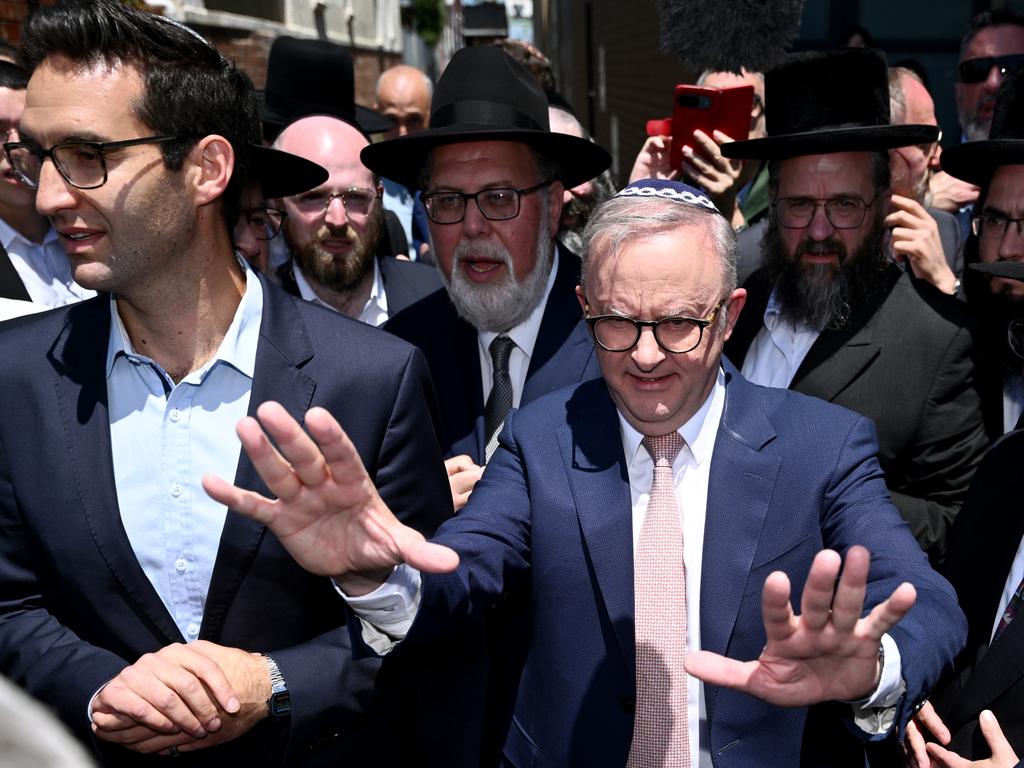
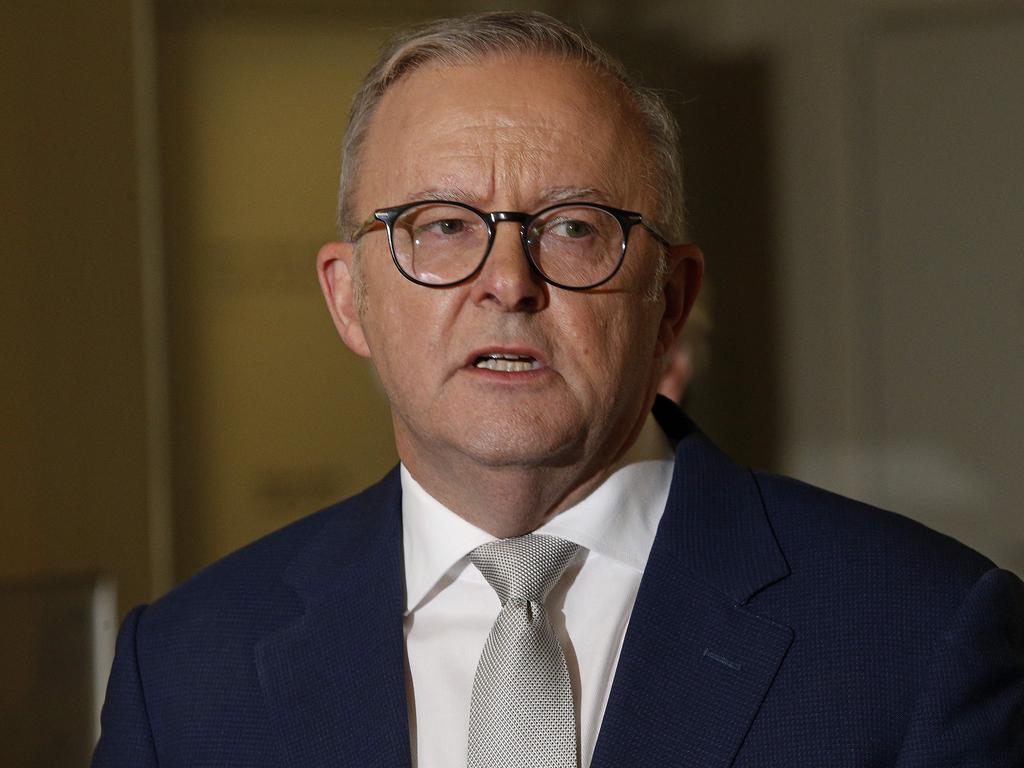
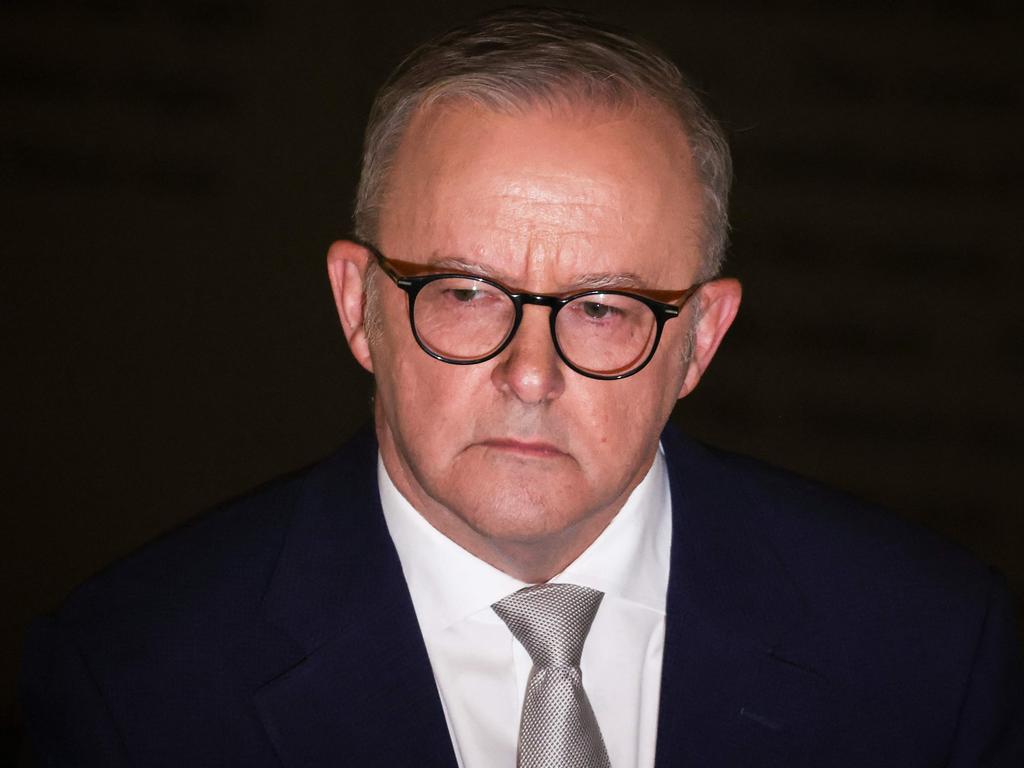
To join the conversation, please log in. Don't have an account? Register
Join the conversation, you are commenting as Logout